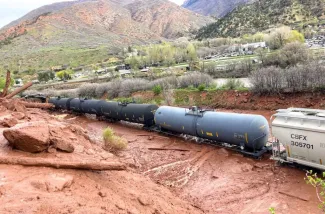
U.S. Supreme Court rules in favor of controversial Utah oil train
© iStock - SeanPavonePhoto
The U.S. Supreme Court ruled in favor of a controversial railway that would connect Colorado to Utah’s oil-rich Uinta Basin, allowing the state to ramp up oil exports.
The unanimous decision released Thursday clears a major hurdle for the proposed Uinta Basin Railway, which has been held up in the courts for several years after Colorado’s Eagle County and five environmental groups sued in 2022.
In 2023, the U.S. Court of Appeals’ D.C. Circuit sided with Eagle County and the environmental groups, ruling that the railway’s initial environmental review was incomplete and failed to consider certain risks, like threats to wildfire or possible water pollution.

PICT A washout covered railroad tracks near Glenwood Springs under a layer of mud on May 2, 2023. City of Glenwood Springs
Thursday’s ruling overturns that decision, returning the case to a lower court for consideration. While it’s a win for the railway, the project still faces other regulatory roadblocks before construction can begin.
The Uinta Basin Railway would transport waxy crude oil — a type of oil that, as its name suggests, is viscous like shoe polish — from the Uinta Basin to national rail lines in Utah, where it would then be exported through Colorado and eventually to refineries on the Gulf Coast.
The 88-mile railway extension could transport an estimated 350,000 barrels each day, massively increasing the state’s oil production — the refineries in Salt Lake City, for instance, currently have a market capacity of 85,000 barrels per day.
Proponents of the project say the railway will help Utah’s economic growth and bring jobs to the Uinta Basin.
But in their lawsuit, environmental groups and Eagle County argued that the federal Surface Transportation Board — the agency tasked with the environmental review — fell short in its analysis in 2021, failing to consider the risks of the railroad expansion.
That includes the upstream risks, like the environmental impact of more oil production in the Uinta Basin; the downstream risks, including potential harms caused by increased oil production on the Gulf Coast; and the downline risks of exporting more oil along the rail line, which the lawsuit claimed could harm wildlife, increase risk of wildfire, and lead to more pollution.

Memebers of the Supreme Court of the United States 2022 - WIkimedia - Public Domain
The appeals court ultimately sided with that argument, nullifying parts of the original environmental impact statement and instructing the board to conduct a more detailed analysis of the risks.
In his opinion issued Thursday, Justice Brett Kavanaugh rejected that decision, writing that the board’s review of the project only needs to focus on the railway’s immediate impacts — not the ripple of environmental concerns flagged in the lawsuit.
“The Board did not need to evaluate potential environmental impacts of the separate upstream and downstream projects,” Kavanaugh wrote. “The environmental consequences of future oil drilling in the Basin are distinct from construction and operation of the railroad line.”
Phil Weiser, Colorado’s attorney general, who filed a brief with the court in support of Eagle County, decried the decision, describing the railway as “a risky scheme to transport waxy crude oil along the Colorado River, right alongside our most critical water resource and posing major risks to Colorado’s Western Slope communities.”
“The proposed project — now allowed by the court’s ruling — lets an out-of-state company build a new 88-mile railway to ship thousands of oil barrels along the river daily,” Weiser said in a statement. “We’ll remain vigilant and deploy every tool available under the law to protect Colorado’s land, air, and water and hold federal agencies accountable to their oversight obligations.”
Justice Neil Gorsuch did not take part in the consideration of the case.
















